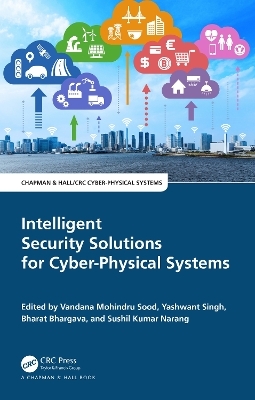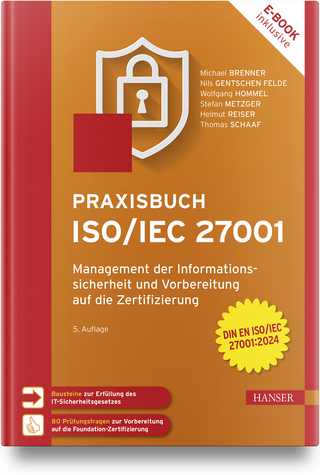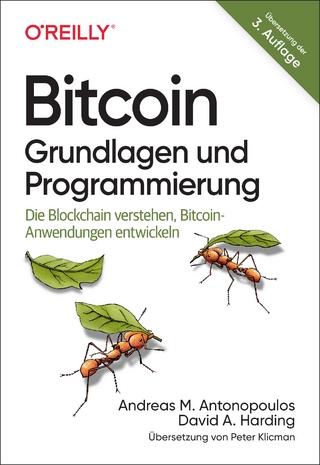
Intelligent Security Solutions for Cyber-Physical Systems
Chapman & Hall/CRC (Verlag)
978-1-032-52152-7 (ISBN)
A cyber-physical system (CPS) is a computer system in which a mechanism is controlled or monitored by computer-based algorithms and involves transdisciplinary approaches, merging theories of cybernetics, mechatronics, design, and process science. This text mainly concentrates on offering a foundational theoretical underpinning, and a comprehensive and coherent review of intelligent security solutions for cyber-physical systems.
Features:
Provides an overview of cyber-physical systems (CPSs) along with security concepts like attack detection methods, cyber-physical systems failures, and risk identification and management
Showcases cyber-physical systems (CPSs) security solutions, lightweight cryptographic solutions, and CPS forensics, etc
Emphasizes machine learning methods for behavior-based intrusion detection in cyber-physical systems (CPSs), resilient machine learning for networked CPS, fog computing industrial CPS, etc
Elaborates classification of network abnormalities in Internet of Things-based cyber-physical systems (CPSs) using deep learning
Includes case studies and applications in the domain of smart grid systems, industrial control systems, smart manufacturing, social network and gaming, electric power grid and energy systems, etc
Dr. Vandana Mohindru Sood is an Assistant Professor in the Department of Computer Science and Engineering (Artificial Intelligence) at Chitkara University Institute of Engineering & Technology, Chitkara University, Punjab, India since 2021. She has more than 11 years of experience in teaching and research. She completed her Ph.D. in Computer Science and engineering from Jaypee University of Information Technology, Himachal Pradesh, India. Dr. Vandana is a renowned researcher in the areas of the Internet of Things, Wireless Sensor Networks, Security, Blockchain, Cryptography, UAV, and Machine Learning. She has published more than thirty technical research papers in leading journals and conferences from IEEE, Elsevier, Springer, etc. She has 376 citations and 13 H-Index. She organized International Conferences and chaired various sessions during the IEEE & Springer conferences. She published 10 utility patents, 4 design patents granted, and edited 3 books. Prof. Yashwant Singh is a Professor & Head of the Department of Computer Science & Information Technology at the Central University of Jammu since 2017. He completed his Ph.D. at Himachal Pradesh University Shimla. His research interests lie in the Internet of Things, Wireless Sensor Networks, and ICS/SCADA Cyber Security, ranging from theory to design to implementation. He has collaborated actively with researchers in several other disciplines of Computer Science, particularly Machine Learning, Electrical Engineering, and Cyber-Physical Systems. He has served on thirty International Conferences and Workshop Program Committees members. He currently serves as coordinator of Kalam Centre for Science and Technology (KCST), Computational System Security System vertical at Central University of Jammu established by DRDO. Yashwant has published more than 80 research articles in International Journals, International Conferences, and Book Chapters of repute. He has 1468 citations and 20 H-Index. He is executing a Research Project on IoT Vulnerability worth Rs.46.322 Lakhs sponsored by DRDO and another project on Cyber Security worth 12.19 Lakhs sponsored by the National Commission for Women. He is a Visiting Professor at Jan Wyzykowski University, Polkowice, Poland. Prof. Bharat Bhargava is a professor of the Department of Computer Science with a courtesy appointment in the School of Electrical & Computer Engineering at Purdue University. Professor Bhargava is conducting research on security and privacy issues in distributed systems. Professor Bhargava is a recipient of seven best paper awards at various international computer science conferences. Professor Bhargava is a Fellow of the Institute of Electrical and Electronics Engineers and of the Institute of Electronics and Telecommunication Engineers. He serves on seven editorial boards of international journals. He also served on the IEEE Computer Society on Technical Achievement award and Fellow committees. Professor Bhargava is the founder of the IEEE Symposium on Reliable and Distributed Systems, IEEE Conference on Digital Library, and the ACM Conference on Information and Knowledge Management. Dr. Sushil Kumar Narang is an Associate Professor and Dean in the Department of Computer Science and Engineering (Artificial Intelligence) at Chitkara University Institute of Engineering & Technology, Chitkara University, Punjab, India. He completed his Ph.D. at Panjab University, Chandigarh, India. His research on “Feature Extraction and Neural Network Classifiers for Optical Character Recognition for Good Quality Handwritten Gurmukhi and Devnagari Characters” focused on various image processing, machine as well as deep learning algorithms. His research interests lie in programming languages, ranging from theory to design to implementation, Image Processing, Data Analytics, and Machine Learning. Dr. Sushil has published technical research papers in leading journals and conferences from IEEE, Elsevier, Springer, etc. He has collaborated actively with researchers in several other disciplines of computer science, particularly Machine Learning on real-world use cases. He is a certified Deep Learning Engineer.
Section I Introduction to Cyber Physical System
1. Cyber-Physical Systems and Their Emergence in Machine Learning
Moushumi Das and Vandana Mohindru Sood
Section II Security Concepts in Cyber-Physical System
2. A General Walkthrough of the Cyber-Physical Systems Concerning
Security Threats and Safety Measures
Indranath Roy
3. Cyber-Physical System Security Attack Detection Methods and Models.
Gurleen Kaur, Kapil Mehta, and Saumya Rajvanshi
Section III Securing Cyber-Physical Systems
4. Lightweight Cryptographic Algorithms for Cyber-Physical Systems.
Sheikh Imroza Manzoor and Yashwant Singh
5. Lightweight Cryptographic Solutions for Resource-constrained Devices in Cyber-Physical System.
G Krishna Pranav, Zeesha Mishra, and Bibhudendra
6. Performance Analysis of Machine Learning Classifiers for Detection of Phishing Websites.
Asadullah Safi, Satwinder Singh, Gurpreet Kaur, Meenakshi, and Tripat Kaur
7. Cybersecurity Issues and Artificial Intelligence-Based Solutions in Cyber-Physical Systems.
Narinder Verma, Neerendra Kumar, Zakir Ahmad Sheikh, Neha Koul, and Ankit Ashish
Section IV Machine Learning for Cyber-Physical Systems
8. A Machine Learning-Based Smart Framework for Intrusion Detection in Cyber-Physical Systems.
Hitakshi, Vandana Mohindru Sood, Kapil Mehta, and Gurleen Kaur
9. Machine Learning Techniques for Real-Time Concept Drift Detection in Industrial Cyber-Physical Systems.
Sangeeta Arora and Sushil Kumar Narang
10. A Hybrid Machine Learning Approach for Intrusion Detection in Cyber-Physical Manufacturing Systems.
Jithish J, Sriram Sankaran, and Krishnashree Achuthan
11. Machine Learning-Based Early Diagnosis of Unstable Cyber-Physical Systems.
Saumya Rajvanshi, Gurleen Kaur, and Kapil Mehta
Section V Application Domains in Cyber-Physical Systems: Challenges, Trends, and Future Scope
12. Challenges Associated with Cybersecurity for Smart Grids Based on IoT.
Suprava Ranjan Laha, Binod Kumar Pattanayak, Saumendra Pattnaik, and
Mohammad Reza Hosenkhan
13. Cybersecurity Challenges in IoT-Based Healthcare Systems: A Survey.
Suprava Ranjan Laha and Debasish Swapnesh Kumar Nayak
14. Rapid Advancement and Trends of Big Data Analytics and Cyber-Physical System Embedded in Healthcare and Industry 4.0.
Chintan Singh, Himanshu Khajuria, and Biswa Prakash Nayak
15. Blockchain-Based Cyber-Physical System: Opportunities and Challenges.
Veerpal Kaur, Devershi Pallavi Bhatt, Sumegh Tharewal, and Pradeep Kumar Tiwari
16. Cybersecurity Challenges, Trends, and Future Directions for Smart Agriculture.
Aditya Sharma and Kamal Deep Garg
| Erscheinungsdatum | 20.04.2024 |
|---|---|
| Reihe/Serie | Chapman & Hall/CRC Cyber-Physical Systems |
| Zusatzinfo | 25 Tables, black and white; 71 Line drawings, black and white; 6 Halftones, black and white; 77 Illustrations, black and white |
| Sprache | englisch |
| Maße | 156 x 234 mm |
| Gewicht | 1500 g |
| Themenwelt | Mathematik / Informatik ► Informatik ► Datenbanken |
| Informatik ► Netzwerke ► Sicherheit / Firewall | |
| Mathematik / Informatik ► Informatik ► Theorie / Studium | |
| Recht / Steuern ► Privatrecht / Bürgerliches Recht ► IT-Recht | |
| ISBN-10 | 1-032-52152-X / 103252152X |
| ISBN-13 | 978-1-032-52152-7 / 9781032521527 |
| Zustand | Neuware |
| Informationen gemäß Produktsicherheitsverordnung (GPSR) | |
| Haben Sie eine Frage zum Produkt? |
aus dem Bereich


